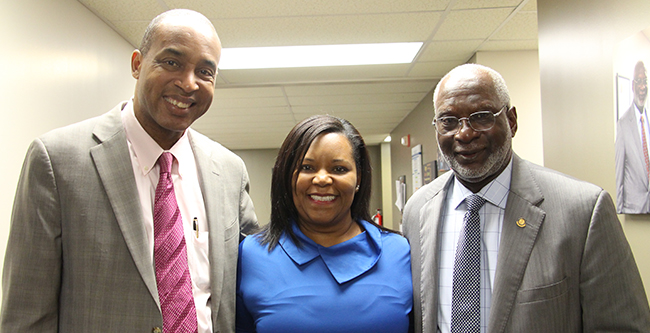
Photo by Matt Schorr
University of Chicago Medicine Chief of the Section for Trauma and Acute Care Surgery and Executive Vice President for Community Health Engagement Selwyn O. Rogers, Jr., MD, MPH; Meharry-Vanderbilt Alliance Executive Director Consuelo H. Wilkins, MD, MSCI; and 16th Surgeon General of the United States David Satcher, MD, PhD.
NASHVILLE, Tenn. Examining violence as a public health issue was the focal point of a roundtable discussion with Selwyn O. Rogers, Jr., MD, MPH and David Satcher, MD, PhD at the Meharry-Vanderbilt Alliance (MVA) on September 6, 2018.
“Cities that people don’t think of as violent often have the same problems as larger metropolitan communities like Chicago,” Dr. Rogers, a professor from the University of Chicago (UC) Medicine, remarked at the outset. “St. Louis, for instance, has the highest murder rate in the United States.”
An ongoing cycle
Rogers serves as UC’s Chief of the Section for Trauma and Acute Care Surgery and Executive Vice President for Community Health Engagement. He is also the Founding Director of the Trauma Center, which he said quickly became one of the busiest medical centers of its kind.
“We often see repeat patients,” he said, noting that violence tends to be an ongoing cycle.
Breaking the cycle
Community leaders and researchers gathered at the MVA for the discussion, which was made possible by Vanderbilt University’s (VU) Master of Public Health Program and the David Satcher Lecture of the Flexner Dean’s Lecture Series. It sought suggestions for breaking that cycle. MVA Executive Director Consuelo H. Wilkins, MD, MSCI, who fielded questions throughout the evening, opened the conversation by asking how communities can take ownership of social determinants that lead to violence.
Dr. Satcher, who previously served as Surgeon General for the United States and President of Meharry Medical College (MMC), suggested it starts with early intervention. “When I released a Surgeon General’s Report on youth violence, we tried to show what it takes to prevent violence,” he said. “It starts early in the lives of children.”
‘If not you, then who?’
Rogers believed it was also important to consider all contributing factors. “When we don’t look at context, we miss opportunities for improvement,” he said. “We’re trying to look at violence more holistically and not as a single episode.”
When prompted again with the question of ownership – “What do we tell people who think it’s not their problem?” – he answered with a simple question of his own: “If not you, then who?”
Continued care
In order to make a positive impact on the issue, Rogers said he and others at the Trauma Center try to connect patients with continued care after they leave. “We hope to be a model for treating trauma patients better, with prevention as well as treatment,” he said.
The current question, he added, was how people can be resilient in the midst of trauma. “If we can figure that out, we may have a way forward,” he said.
Backgrounds
Rogers’ clinical and research interests focus on the health care needs of underserved populations. He builds interdisciplinary teams to address health disparities and the societal factors that affect individuals and communities affected by violence. As a junior faculty member at Vanderbilt University (VU) and MMC, Rogers obtained his Master in Public Health Degree from Vanderbilt. He has 16 years of trauma care experience and is leading an initiative to expand trauma care in the South Side of Chicago.
Satcher was a four-star admiral in the United States Public Health Service Commissioned Corp and served as the 10th Assistant Secretary for Health and the 16th Surgeon General of the United States. He is a former President at MMC and the Founding Director and Senior Advisor of the Satcher Health Leadership Institute.
About the Meharry-Vanderbilt Alliance
Founded in 1999, the Alliance bridges the institutions of Meharry Medical College and Vanderbilt University Medical Center. Its mission is to enrich learning and advance clinical research in three primary areas -- community engagement, interprofessional education and research -- by developing and supporting mutually beneficial partnerships between Meharry Medical College, Vanderbilt University Medical Center and the communities they serve. Through community engagement, the Alliance serves a large community of stakeholders including surrounding universities and colleges, community organizations, faith-based outlets and community health centers. Its interprofessional education enhances students' interdisciplinary understanding and improves patient outcomes through integrated care. The research conducted provides access to experienced grant writers and materials supporting the grant application process and facilitates grant-writing workshop.




